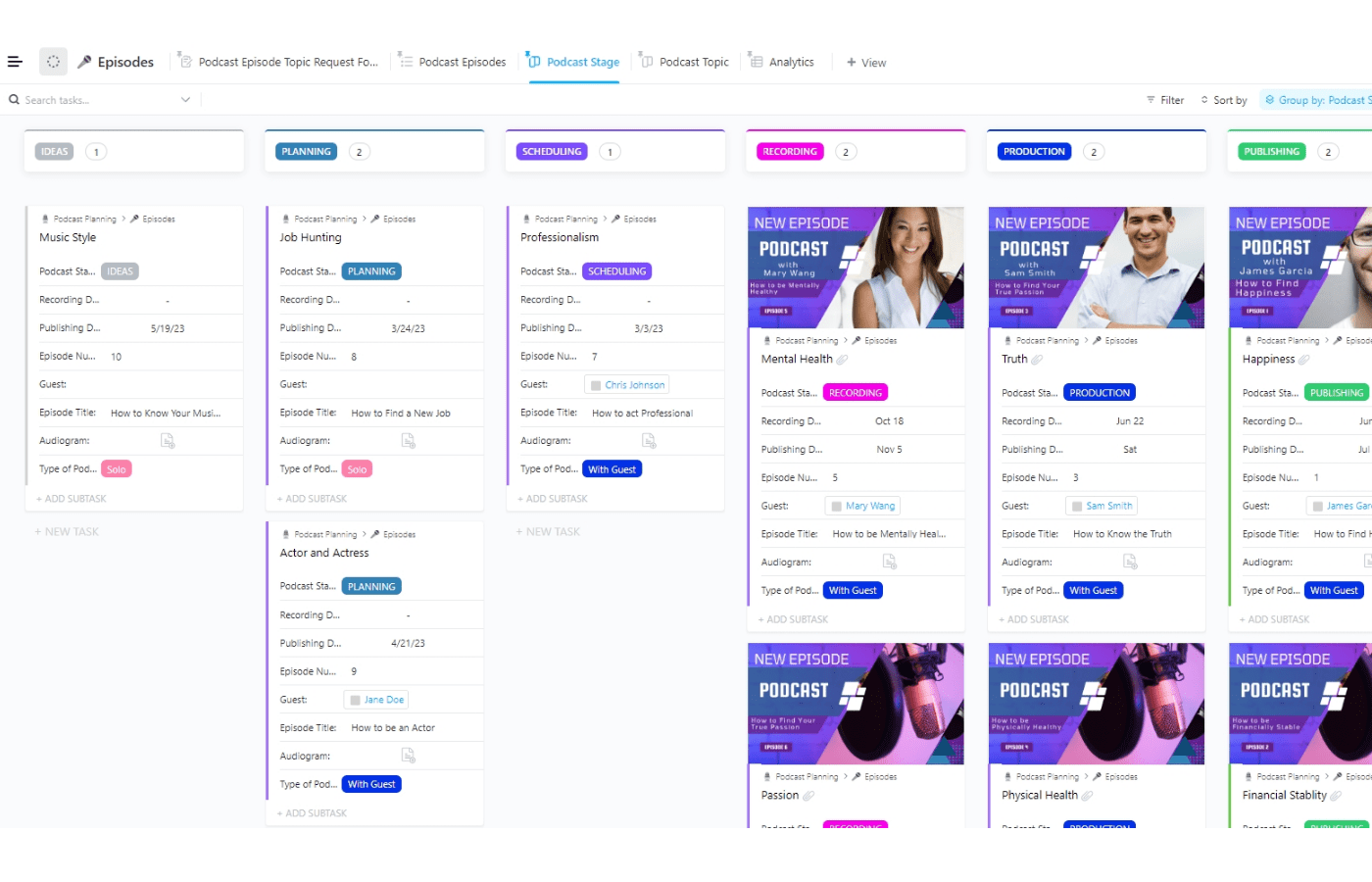Did you know that the concept of project management has a history dating back to 2570 BC and the building of the Great Pyramid of Giza?
It took several thousand years of evolution for the discipline of project management to take its current form, but current project managers (PMs) and their team members are now more efficient than ever before. While many of these improvements can be chalked up to current- and next-gen technologies, the standard project management career path ensures that all prospective PMs are given the best start possible.
| Top Project Management Careers | Salary Range | Years of experience | Key Skills |
|---|---|---|---|
| Top Entry-Level Position: Project Scheduler | $80,000 – $113,000 | 1 – 4 | Team leadership and supervision / project management lifecycle planning/program and portfolio management (PPM) / change management / risk management / time management / computer software skills / data analysis / executive communications |
| Top Mid-Career Position: Project Manager | $87,000 – $170,000 | 3 – 6 | Planning and scheduling / organizational skills / problem-solving / computer software skills/data entry, management, and analysis / administrative and clerical skills / interpersonal communications |
| Top Senior Level Position: Director of Project Management | $150,000 – $190,000 | 5+ | Team leadership and supervision / project management lifecycle planning/program and portfolio management (PPM) / change management/risk management / time management / computer software skills / data analysis / executive communications |
Project Management Career Outlook
The extended outlook for the field of project management is quite favorable. According to Project Management Institute (PMI), demand for experienced PMs is currently growing faster than the demand for any other discipline in any other occupation. This trend is expected to continue until at least 2027, when the same report suggests that approximately 88 million workers will be staffed in roles related to project management. Per PMI’s report, workforces in China and India are expected to comprise the majority of these workers.
Some roles, like the title of Project Specialist, are expected to see 7% growth between 2021 and 2031, according to the U.S. Bureau of Labor Statistics. Approximately 70,000 new Project Specialist roles are created on an annual basis, but many of these openings are due to current professionals retiring or changing careers.
Most forecasts agree that the field of project management will remain steady and consistent for years to come. Now is a great time to get started with your project management career, whether you’re a recent graduate or an established professional looking for a new opportunity, and there are openings in nearly every industry imaginable.
Entry-Level Project Management Roles
Most experienced project managers begin their careers in one of several entry-level roles. This includes recent graduates and those who are transitioning from other careers. Most individuals should already have the knowledge needed from their academics or prior work experience, so these roles are primarily about learning the fundamentals and getting to know the nuances of project management.
Project Administrator
Salary Range: $53,000 – $70,000 per year
Years of experience: 1 – 3 years
What does a Project Administrator do?
Although this is an entry-level role in the field of project management, it’s not necessarily an entry-level role in general. Most employers are actively looking for project administrators who already have experience in the field. Barring that, an education – preferably business-related – is highly desirable.
Project administrators are typically seen in industries like healthcare, engineering, pharmaceutical, and others, where they often serve in direct support of mid- or senior-level project managers. As such, they tend to have a lot of day-to-day responsibilities.
What are the Project Administrator’s key responsibilities?
- Tracking projects on a short- and long-term basis
- Scheduling meetings and taking meeting minutes
- Planning, arranging, and organizing venues and facilities
- Maintaining regulatory compliance
- Hiring and monitoring contractors
- Performing various administrative duties as needed
What key skills should a Project Administrator have?
- Team leadership
- Interpersonal communications
- Telephone/email skills
- Administrative/clerical skills
What previous experience or training is needed as a Project Administrator?
- Associate or bachelor’s degree in a business-related field
Assistant Project Manager
Salary Range: $55,000 – $85,000 per year
Years of experience: 2 – 4 years
What does an Assistant Project Manager do?
The Assistant Project Manager serves as a liaison between the project manager and the project teammates. In many cases, they are also responsible for taking on specific phases or deliverables within a project. They fulfill any general project management duties on an as-needed basis.
What are the Assistant Project Manager’s key responsibilities?
- Monitoring project schedules
- Reporting on project progress
- Overseeing project budgeting and spending
- Allocating necessary resources to projects
What key skills should an Assistant Project Manager have?
- Team leadership
- Reports and presentations
- Financial planning and budgeting
- Resource allocation
- Administrative/clerical skills
What previous experience or training is needed as an Assistant Project Manager?
- Associate or bachelor’s degree in a business or financial field
- Optional: Project Management Professional (PMP) Certification
Project Coordinator
Salary Range: $52,000 – $66,000 per year
Years of experience: 2 – 4 years
What does a Project Coordinator do?
The Project Coordinator plays a very hands-on role in the day-to-day tasks and activities of their assigned projects. Not only do they work with clients to understand their needs and establish the overall project scope, but they also maintain communications with team members, organize activities into manageable chunks, and much more.
What are the Project Coordinator’s key responsibilities?
- Serving as primary point-of-contact for all subordinate project team members
- Identifying and defining project requirements with individual clients
- Conducting quality assurance analyses according to project standards
- Splitting large projects into smaller, manageable chunks
- Communicating with clients as requirements and objectives evolve over time
- Coordinating resources, schedules, data, and equipment across various projects
- Maintaining project documentation
- Analyzing project risks
- Issuing legal paperwork as needed
What key skills should a Project Coordinator have?
- Client/team communications
- Planning and scheduling
- Time management
- Resource allocation
- Data management, entry, and analysis
- Risk management
- Problem-solving
What previous experience or training is needed as a Project Coordinator?
- Bachelor’s degree in business administration or a related field
- Optional: Project Management Professional (PMP) Certification
Project Scheduler
Salary Range: $80,000 – $113,000 per year
Years of experience: 1 – 4 years
What does a Project Scheduler do?
The Project Scheduler works closely with project managers, technical experts, and project team members to develop day-to-day schedules and implement an efficient project scheduling system. Much like the role of project administrator, this is a great opportunity for recent graduates and those who are transitioning from other, similar careers.
What are the Project Scheduler’s key responsibilities?
- Planning project schedules
- Coordinating day-to-day tasks and activities
- Identifying potential scheduling delays
- Monitoring long-term project timelines
- Preparing and delivering project progress reports
- Communicating with project stakeholders
What key skills should a Project Scheduler have?
- Planning and scheduling
- Organizational skills
- Problem-solving
- Computer software skills
- Data entry, management, and analysis
- Administrative/clerical skills
- Interpersonal communications
What previous experience or training is needed as a Project Scheduler?
- Bachelor’s degree in project management or a related field
- Project Management Institute Scheduling Professional (PMI-SP)
Mid-Career Project Management Roles
After gaining some hands-on experience through entry-level roles, you’ll be ready to progress to the mid-level of your career in project management. These positions come with even greater levels of responsibility than before, but the added compensation makes it well worth it.
Project Manager
Salary Range: $87,000 – $170,000 per year
Years of experience: 3 – 6 years
What does a Project Manager do?
When most people think about project management, they usually envision the role of the Project Manager. This role is responsible for defining the overall project scope, participating in project budgeting, overseeing project resources, and communicating with project stakeholders as needed.
In some cases, project managers can be assigned at various levels. For example, Project Manager I, Project Manager II, Project Manager III, and Project Manager IV. These roles all represent an increasing amount of responsibility, but they generally include an increase in pay, too.
What are the Project Manager’s key responsibilities?
- Coordinating the day-to-day workloads of team members
- Participating in project planning and implementation
- Budgeting on a per-project basis
- Performing ongoing risk analysis
- Implementing changes as they happen
- Troubleshooting project issues and performing quality assurance
What key skills should a Project Manager have?
- Team leadership, supervision, and management
- Stakeholder and customer communications
- Budgeting
- Risk analysis
- Problem-solving
- Time management
- Experience in Agile, Lean, Kanban, Six Sigma, or a similar project management methodology
What previous experience or training is needed as a Project Manager?
- Bachelor’s or master’s degree in a related field
- Optional: Project Management Professional (PMP) Certification
- Optional: Certified Associate in Project Management (CAPM)
Project Team Lead
Salary Range: $89,000 – $115,000
Years of experience: 2 – 6 years
What does a Project Team Lead do?
Also known as a Project Lead or Project Leader, the role of the Project Team Lead varies from company to company. In many cases, the job involves many of the same responsibilities as a project manager. However, project team leads typically lack the academic credentials or hands-on experience that would grant them the title of project manager. In many cases, the project lead reports directly to the project manager.
What are the Project Team Lead’s key responsibilities?
- Organizing and overseeing the daily workloads and responsibilities of team members
- Maintaining communications between team members, clients, and stakeholders
- Participating in project planning
- Budgeting on a per-project basis
- Performing thorough risk analysis
- Implementing changes as they happen
What key skills should a Project Team Lead have?
- Team leadership
- Organizational skills
- Risk analysis
- Problem-solving
- Time management
- Interpersonal communications
What previous experience or training is needed as a Project Team Lead?
- Associate’s or bachelor’s degree in a related field
Scrum Master
Salary Range: $70,000 – $150,000
Years of experience: 4+
What does a Scrum Master do?
The Scrum Master is in charge of implementing and overseeing Agile methodology on a per-project basis. It’s a highly collaborative role, as scrum masters often work with PMs, clients, stakeholders, and subordinate team members, so it’s best suited for professionals who know how to excel in fast-paced, multifaceted work environments.
What are the Scrum Master’s key responsibilities?
- Planning and leading daily meetings, reviews, or demos
- Coaching teammates regarding best practices and day-to-day productivity
- Answering questions on Agile methodology and key scrum principles
- Identifying potential bottlenecks or shortcomings
- Utilizing project management software to track and update daily activities
What key skills should a Scrum Master have?
- Multitasking abilities
- Public speaking
- Planning, scheduling, and organizational skills
- Computer software skills
- Troubleshooting and problem-solving
- Interpersonal communications
What previous experience or training is needed as a Scrum Master?
- Bachelor’s or master’s degree in business administration or a related field
- Certified Scrum Master (CSM) or similar accreditation
Senior-Level Project Management Roles
Most professionals who enter the field of project management are ultimately targeting senior-level roles. Those who are willing to put in the time and hard work – throughout both their career and academics – often find that these senior-level roles are well worth the effort.
Senior Project Manager
Salary Range: $101,000 – $160,000
Years of experience: 4 – 6 years
What does a Senior Project Manager do?
The Senior Project Manager takes ownership of the full project lifecycle, from initial conception to project completion. Additionally, most senior project managers play an active role in hiring, training, reviewing, and supervising employees. In some organizations, the senior project manager is replaced with the senior program manager.
What are the Senior Project Manager’s key responsibilities?
- Overseeing the complete project lifecycle, including planning, development, and completion
- Managing and supervising project team members
- Communicating with all project stakeholders
- Training and mentoring new employees
- Making key hiring decisions
What key skills should a Senior Project Manager have?
- Team leadership and supervision
- Project/product lifecycle management
- Planning and development
- Hiring and training
- Computer software skills
- Data analysis
- Interpersonal communications
What previous experience or training is needed as a Senior Project Manager?
- Bachelor’s or master’s degree in a related field
- Optional: Project Management Professional (PMP) Certification
- Optional: Certified Associate in Project Management (CAPM)
- Optional: Certified Scrum Master (CSM) or similar accreditation
Director of Project Management
Salary Range: $150,000 – $190,000
Years of experience: 5+ years
What does a Director of Project Management do?
Also known as Project Management Director, Director of Program Management, or Program Management Director, the title of Director of Project Management is the most authoritative role in the field. These professionals are company executives who are often tasked with overseeing multiple simultaneous projects across all of the company’s departments. If anyone has a complete perspective over every project in an organization’s pipeline, it’s the director of project management.
What are the Director of Project Management’s key responsibilities?
- Delivering strategic leadership when planning and directing new or ongoing projects
- Reviewing project plans
- Overseeing project implementation
- Tracking and monitoring project deliverables
- Selecting individual team members for specific projects
- Establishing performance metrics for senior executives
- Implementing change and risk management controls
- Providing direct support to other project leaders as needed
What key skills should a Director of Project Management have?
- Team leadership and supervision
- Project management lifecycle planning
- Program and portfolio management (PPM)
- Change management
- Risk management
- Time management
- Computer software skills
- Data analysis
- Executive communications
What previous experience or training is needed as a Director of Project Management?
- Bachelor’s or master’s degree in project management or a related field
- Optional: Project Management Professional (PMP) Certification
- Optional: Certified Associate in Project Management (CAPM)
- Optional: Certified Scrum Master (CSM) or similar accreditation
Why Pursue a Career in Project Management?
Although project management is often seen as a dull, boring, and monotonous career, it can be fun and exciting – it really depends on the industry. Learning how to manage and oversee projects in a field that you’re already interested in can be incredibly rewarding, both monetarily and personally, but you have to be willing to put in the hard work, too. Learn more finding a job in project management.
Most project managers enjoy a great deal of job security, with opportunities available in many different industries, and, in some cases, it’s a job that can be done remotely. With a strong, steady outlook for the future, project management is a very promising career choice for anyone who’s bright, diligent, and dedicated to team-oriented success.





